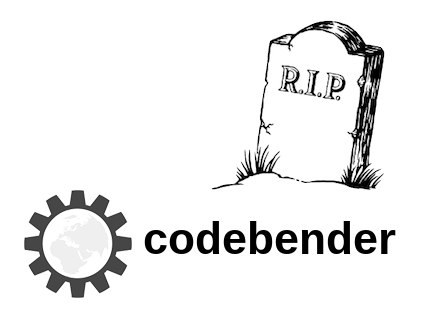>> codebender.cc CLOSING ITS DOORS - IS THIS A NEW IoT TREND?
There is no such thing as a "free lunch" - is the free attitude of IoT coming
to an end?

I received an email yesterday from the CEO and founder of codebender.cc -
a website that was launched to allow the sharing and collaboration of writing
code for IoT projects, was going to
shutdown
its free service. The motivation? Running a cloud service like this costs
money and with investment either drying up or more competition entering the
market space - who will end up paying for it? Is this the beginning of the
end of free services for IoT in the cloud?
If you do not know the expression -
"there is no such thing as a free lunch" - now you do.
In a nutshell, we've been unable to create a sustainable business model
around codebender.cc, and we simply can't afford to pick up the tab for
running the site out of our own pockets anymore (did you know it costs
$25K/month to provide our service?).
source: codebender.cc email from CEO and founder
While it is unfortunate that codebender.cc is planning to shutdown it's free
service, how dependent are IoT developers coming on free services in the
cloud for not only learning how systems work, developing and compiling firmware
online, but what about those who handle the distribution and maintenance of
such IoT services? Will your IoT devices become stagnant while deployed?
Unfortunately; this is a trend in the start-up ecosystem - the typical
life-cycle of a startup:
* conceive idea
* prototype, run on bootstrap funds
* offer service for free, attract users
* repeat
* approach investors, get funding
* pay salaries, build team, expend offering
* until ((sold) OR (lack of funding))
* if (sold) merge into new company else bankrupt and shutdown
I've seen this time and time again; heck, I have been part of some startup
companies that are still operating with the same mentality. It is fun
while it lasts; but, at some point - being a founder, you end up diluting
your ownership as more and more funding comes in. The biggest failure is
not developing an appropriate business plan such that you can become
independent of funding.
We all have good intensions; heck,
forbes.com
has even posted tips on how to prepare to be in the 10% of startups that
actually make it (yes, 90% of startups will fail). But what does that mean
for businesses that launch new products that are dependent on such services
or have forced tie-ins due to the IoT hardware/services that they build upon?
As an example; lets say you retrofitted your rental house property
- where you have hundreds of tennants per year, with an IoT based
electronic locks that utilize a free cloud service to remotely
change the PIN code for access (as new tenants arrive). Everything will
work as expected until that cloud service shuts its doors because it ran
out of funding - are your locks useless now?
I guess all it comes down to picking the right IoT companies to work with
or look for ones that actually have a sustainable business model so they
can survive. I have always found that it is better to control all parts
of the process - but hardware, cloud services are so freely available it
is difficult to justify re-inventing the wheel and there is tendency to use
what is available for free.
Creating an startup or offered options in one? Remember this -
10% of nothing, is still nothing.